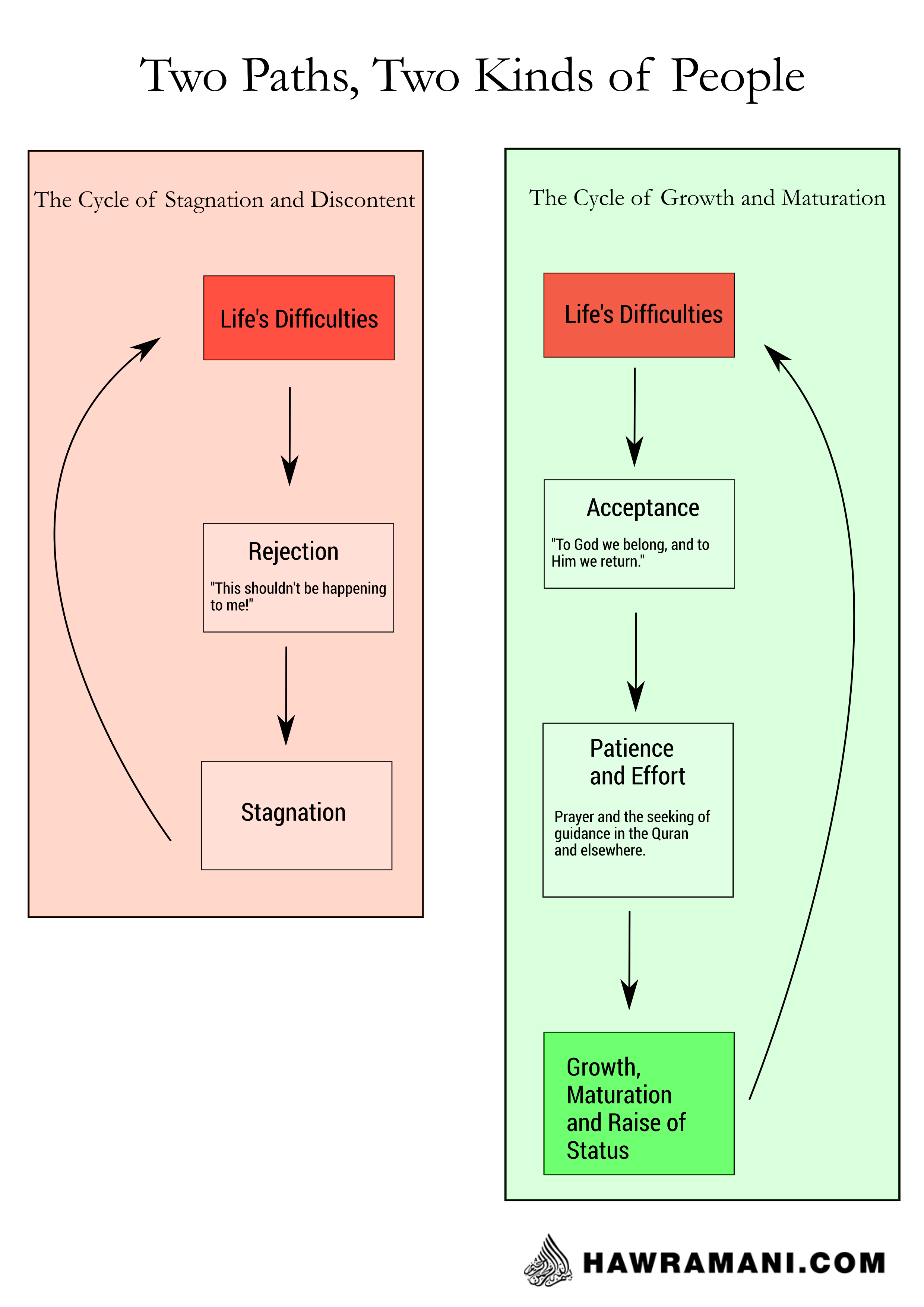
Flowering Azaleas by Marie Egner (c. 1895)
I would appreciate some advice. I pray all my prayers on time and I read Quran daily, along with other forms of worship, but I feel so numb & empty. I feel like I have no purpose in this life, like if I died it won't even matter. I don't affect this Ummah in any way. I just work full-time, I'm single, I don't have friends, my family and relatives are not on good terms, and I have social anxiety so I hate interacting with others. I feel so useless, is there a point to my worship?
It is human nature to want to be productive and achieve things for the sake of any cause you believe in, such as Islam. But ideally, your Islam should not be in any way attached to results.
Even if you were the only remaining human on earth, you can still perfectly apply Islam in your life, achieving your mission in life and a great success in the afterlife.
Your mission is the same as the Prophet’s mission, peace be upon him. It is to read the Quran and apply it wherever you can in your life, living by its manners, principles and philosophy.
When speaking of placing humans on Earth, God said to the angels, “I am placing a steward on Earth.” What is a steward? It is someone who takes care of something, for example a farm, for the sake of its owner, until the owner comes back.
We Muslims (and faithful Christians and others) are stewards on Earth. Our job is to take care of it for the sake of its Master. And this is achieved by following God’s Straight Path. The Straight Path is a program designed to ensure two things: humanity’s long-term survival (by placing various mechanisms to ensure that humanity doesn’t die out), and humanity’s short-term moral integrity (never justifying evil in the name of the greater good, never saying “the end justifies the means”).
We stewards are God’s representatives on Earth, and an important part of our stewardship is to keep God’s remembrance alive:
"And I have chosen you so listen to what is being revealed.
"Indeed, I am God, there is no god except Me, so worship Me and establish the prayer for My remembrance. (The Quran, verses 20:13-14)
Regardless of your situation, you are always able to fully live your life as a Muslim. You do not need anyone else’s involvement, this is something between you and God.
I have lived alone twice in my life, once when I was 18 and another time when I was 27, and both are some of the worst experiences of my life. I understand the difficulty of your situation, and how purposeless and meaningless it feels.
These are the times when your faith in God is tested. Will you think bad thoughts about Him, consider Him incapable of helping you, or consider Him unkind so that He wants you to suffer?
If we are fair-weather friends of God, then we will worship Him and love Him when things are easy, and once things get truly difficult, once our patience is tested, we fail the test and prove that we are unworthy of being honored by Him.
The Prophet, peace be upon him, suffered many hardships during his career that must have seemed purposeless and needless, since God had the power to protect him at all times and to ensure the very best for him. For 13 years he and his followers had to suffer under the hands of the pagans of Mecca. Couldn’t have God made this only one year, so that the Prophet and his followers used their time more productively? Couldn’t they have used all these years of suffering better if God had enabled Islam to spread faster? What was the point of the Prophet losing his wife and his main protector in Mecca, his uncle Abu Talib, at a crucial place in his career, greatly weakening him?
What the Prophet was taught with all of these difficulties is that God is a King, and He does as He wishes with His servants. If we have truly submitted, we will accept His decrees, thinking the best of Him and continuing to love Him, praise Him and worship Him, even as we suffer knowing that He can end our suffering.
Know that God has no need of you. You cannot do God any favors. No matter how talented or capable you are, God can always create someone with exactly your talents and abilities in little time. Everything we do for God’s sake is actually a gift from Him, because it is He who taught us, guided us, and sustained us throughout all of these years so that we could do this thing in His name and claim credit for it.
Any good deed you do for God is actually a favor from Him. If you want to be productive, to serve Islam, Muslims and humanity, what you are actually asking is for God to give you the favor of being useful in His cause.
You are asking God for a great favor. Ask yourself if you deserve it. Ibn al-Qayyim says:
Whoever, among the workers, wishes to know his status in the eye of the King, let him look at what jobs He gives him and with what He busies him.
If you want the King to give you a great job that ensures you rewards in this life and the afterlife, then you must know that this job is given to those He wishes, and not to everyone. You must purify yourself, rededicate yourself to God, give up all sinful behaviors, and constantly seek His guidance and forgiveness, while remaining patient and thinking the best of Him, and in this way you will be guided to Him step by step, month after month, until you reach a place where He decides to give you a better task in life.
There are no shortcuts if you want to be a sincere and useful servant of God. You must turn yourself into the type of person who deserves God’s honors and favors, and He will give these to you.
God can change your situation in an instant, solving all of your problems, giving you immense knowledge and placing you somewhere where you can be a great and highly admired leader. God will not do this for you, because God does not perform miracles for us. If God did miracles for us, yet we sinned afterwards, this would cause us to deserve the utmost punishment from Him, as happened to Jesus’s apostles:
112. “And when the disciples said, 'O Jesus son of Mary, is your Lord able to bring down for us a feast from heaven?' He said, 'Fear God, if you are believers.'“
113. They said, “We wish to eat from it, so that our hearts may be reassured, and know that you have told us the truth, and be among those who witness it.”
114. Jesus son of Mary said, “O God, our Lord, send down for us a table from heaven, to be a festival for us, for the first of us, and the last of us, and a sign from You; and provide for us; You are the Best of providers.”
115. God said, “I will send it down to you. But whoever among you disbelieves thereafter, I will punish him with a punishment the like of which I never punish any other being.” (The Quran, verses 5:112-115)
They demanded a miracle from God, and God answered their prayer. But to maintain justice, it is necessary for God to hold these people who see the miracle to extremely stringent standards afterwards. Disobeying God after seeing physical evidence with your own eyes of His power is a far greater sin than disobeying God while He feels hidden from you.
It is out of His mercy that He does not do miracles for us. If He did miracles, this would be a burden that many of us couldn’t carry. On the one hand, it would cheapen our good deeds, because now we’d be doing them while having some proof of God’s existence. On the other hand, it would greatly increase our sinfulness if we disobeyed Him in anything, because we’d be committing sins while having had direct experience of Him.
What God wants, instead, is for us to go through the boring, difficult, numbing experiences of life, so that the good we do can be fully attributed to us, and so that we can be rewarded for our faith and patience. If God intervened directly in our lives, showing Himself and performing miracles, all of these things possibilities would be destroyed.
Accept your situation, knowing that God is fully capable of changing it in an instant. He wants you to be responsible for the change, so that He can reward you for it, instead of He Himself causing the change directly and taking away the chance for you to prove yourself.
Nothing you achieve in this life is going to be of any worth except the record of your deeds. Even if you build the world’s greatest mosque in His name, when the world ends, it will be destroyed and turned into nothing, as if it never existed. If you want to work for Him, then know that results only come through Him, and not through your own efforts. If He allows you to achieve any success in His name, then know that this is a favor from Him, not a favor from you to Him.
This is not to say that nothing we do for Him is of value, saying that He can accomplish anything He wants Himself. It is, rather, to realize that there are two worlds, the world of the seen and the world of the unseen. The unseen world is that which has priority. Nothing you do in the seen world is of value if the unseen part of your world is corrupt. And nothing you do in the unseen world is worthless regardless of your results in the seen world.
Becoming a chosen servant of God
If you want to become the type of servant that God favors by making him or her productive in His cause, then these are the steps you can follow to accomplish this.
1. Clean your slate
Chronic sins in your life will block God’s blessings. You cannot hope to be honored by God if part of your life is in direct contradiction to His teachings. For example, if you have usurious debt (debt upon which you pay interest, such as mortgage, car or credit card debt), then this is going to be a blocker of God’s blessings in your life. If you have cut off your relationship with a family member despite the fact that God commands love and kindness and tolerance toward them, then this will block God’s blessings.
Think of your life and find anything that could be considered a chronic sin, and fix it as soon as you can, doing your utmost to do so. God will not believe you to be sincere in wishing for His forgiveness and love if your life contains sinful parts that are insults toward Him.
The next thing to do is to ask God for His forgiveness for every great and small sin you have ever committed. Do this with every prostration of every one of your formal prayers, and do it after every formal prayer.
Equally important is to not add new sins to your record. Your goal should be to have a pristine record, clear of all sins. You cannot hope to have God’s favors if you are carrying a great burden of sins on your back.
2. Reestablish your connection with God through worship and Quran-reading
Perform tahajjud at night and read Quran between every two units. The Quran is the most important guide in our lives, because it is humanly impossible for us to remain mindful of all of our duties and concerns. Without the Quran, we end up focusing on one thing and ignoring other equally important things. We may think that being kind to our parents, or being charitable, or doing public service, or performing dhikr throughout the day, is the most important thing in life. We invariably edge toward one or a few things and lose our balance. Through daily Quran reading, we are made mindful of every possible mistake and are reminded of the dozens of things that we need to balance in life to be well-rounded and complete believers. There is no one clever maxim or teaching (“subdue the ego!”) that can replace the Quran, nothing can replace it because humans are complicated and life is complicated and to remain on track and to remain connected with God in the best way possible, we need its thousands of verses to help shape our characters and correct our errors.
For more tahajjud please see my essay: Mysticism without Sufism: A Guide to Tahajjud, Islam’s Meditation Practice
Sit down for a few minutes after every formal prayer, supplicating to God for everything you desire. Do this with all of your five prayers.
3. Be patient and do not expect results
Even if you do not see results for months, detach yourself from expecting results, knowing that God is a King, and a King does what He wills with His servants. Submit to His decree. Do your part of worship, seeking forgiveness and avoiding sins, knowing that God will do His part. If you repent, worship Him ardently and constantly pray for His help, yet see no results for a week or two, what do you know, perhaps if you are patient, results will come in a few months, when you are ready for it.
If you feel numb, uncared for and abandoned, then realize that all of us have felt like that at some point in our lives, even the Prophet, who after revealing the first few revelations, stopped receiving revelation for a period of six months to two years, after which these verses were revealed:
1. By the morning light.
2. And the night as it settles.
3. Your Lord did not abandon you, nor did He forget.
4. The Hereafter is better for you than the First.
5. And your Lord will give you, and you will be satisfied.
6. Did He not find you orphaned, and sheltered you?
7. And found you wandering, and guided you?
8. And found you in need, and enriched you?
9. Therefore, do not mistreat the orphan.
10. Nor rebuff the seeker.
11. But proclaim the blessings of your Lord. (The Quran, verses 93:1-8)
4. Read
An important help toward being patient, thinking the best of God and understanding His decrees is to read. Read Ibn al-Jawzi‘s and Ibn al-Qayyim‘s sayings. If you do not speak Arabic, read multiple translations of the Quran, especially Muhammad Abdel-Haleem’s. Read Tariq Ramadan’s In the Footsteps of the Prophet if you haven’t. Read every good Islamic book you can find, especially by modern, mainstream writers.
5. Put your hopes in the afterlife
This world will never live up to your expectations, and nothing you achieve in it will last forever. It is a central spiritual teaching of the Quran to focus more on the hereafter than on the present life, as verse 4 above teaches.
Think of this world as nothing more than a waiting room. You are here for a while, waiting for the door to be opened, behind which there is a beautiful and thriving city where you can finally have peace and freedom from all stress and worry. Arriving at this city must be your goal, you must never be deluded by the cheap counterfeit goods of the worldly life, which almost always cause as much pain as the pleasure they bring.
If you at this moment feel depressed and unable to do anything for the afterlife, then wait patiently, and this in itself is worship. Imagine yourself waiting in that waiting room. Just wait, if you cannot do anything more. Wait, knowing that eventually the door will open. You do not need to do anything more than waiting, God does not burden you with more than you are able.
6. Be easy on yourself
A mistake many of us make is to rededicate ourselves to God for a short period of time, such a during Ramadan, only to burn out, feeling that we can never be the perfect saint that we hope to be.
Never push yourself beyond what you are able to carry at this moment. Continue to enjoy what you enjoy, reading novels, browsing your favorite sites, playing video games, doing whatever (non-sinful) thing you enjoy doing.
Islam does not ask you to give up the pleasures of this world, or to turn yourself into a God-worshiping robot. It asks you reform your life, to remain close to God as much as you are able, and to continue living a normal human life. God does not blame you for enjoying yourself, for taking the time off to go to the park, to listen to music, to do anything you find enjoyable and uplifting.
Be gentle with yourself and increase what you do for God only when you are able. If today you are tired and cannot perform an extra good deed that you performed yesterday, then do not do it.
Pushing yourself too hard can cause your ego to rebel, because it will feel like Islam is an enemy that wants to prevent it from enjoying life. Children and teenagers also feel this way when their parents try to push them too hard to be pious and religious.
Instead, be a gentle and kind master with yourself, respecting your own dignity and giving yourself time to do what you enjoy.
7. Rely on His guidance
Another mistake that people make is losing hope in God’s ability to guide them. They lose hope and think that they are permanently lost, thinking as if God is incapable of reaching into their lives and purifying it again. The truth that Quran teaches us is that God is with us every hour of every day, teaching us, educating us, helping us overcome challenges and grow into better humans.
Some Muslims, especially strict ones, mistakenly think that for a person to acquire guidance, a thousand things have to go exactly perfectly for them. In reality, once a person accepts the Quran as their guide, and sincerely prays to God for guidance, then their guidance is assured. God will take care of arranging for them everything necessary to help them grow and improve. The Quran speaks much of guidance (al-huda), and there would be little point in mentioning this if it was all about a human’s own efforts toward learning about God and Islam. Rather, guidance is largely about God bestowing His favor upon humans, inspiring them and helping them along the way:
God chooses to Himself whom He wills, and He guides to Himself whoever repents. (The Quran, 42:13)
He said, “I am going towards my Lord, and He will guide me.” (The Quran, verse 37:99)
No matter how lost you feel, pray to God for guidance, and He will guide you, in ways you do not expect. He will arrange for you to go through the right experiences, to hear, read and see the right things, to be able to learn and grow and mature. What you must do, above all, is repent and be sincere.
On social anxiety and loneliness
I too do not enjoy social interactions except with people I know really well. This is perfectly normal. It is not a character flaw, it is due to your genes. If you get only four hours of sleep one night, the next day nearly all of your social anxiety will be gone, because the parts of your brain that cause you social anxiety will stop doing their usual thing.
Consider social anxiety just one of life’s annoyances, similar to a person who has an accident and has to limp for the rest of their lives. It is probably never going away completely, although many things can significantly reduce it (such as gaining wealth and status). Accept social anxiety as a part of life and move on. There are people who are blind, be thankful that your problem is not as serious. It will still get in the way of enjoying a life that people would call normal, but it is not more than you can bear.
When you are in a situation where your social anxiety becomes a factor, it is like a person who has a limp being expected to move fast or run. It is not enjoyable and you’d much rather avoid it, but if you think of it as just another physical disability, then you will be able to handle it with few negative emotions. If people constantly expect you to be outgoing and comfortable socially, then the blame is on them for expecting you to act in a way you are not designed to act. Instead of trying to live up to their expectations, trying to act the way their genes make them act, instead of acting the way your genes make you act, be comfortable with yourself, accepting your limitations, finding social enjoyment in the ways you can (instead of in the ways people expect), and having hope that as you grow older, you will learn better ways of dealing with the issue.
If you feel lonely and wish for meaningful social interactions, for example with a loving spouse, then you can pray for this and let God decide when and how you will have it. Loneliness is just one of the many tests of life, and the happiness we desire from ending our loneliness is only something that God can give to us:
42. And that to your Lord is the finality.
43. And that it is He who causes laughter and weeping.
44. And that it is He who gives death and life.
45. And that it is He who created the two kinds—the male and the female.
46. From a sperm drop, when emitted.
47. And that upon Him is the next existence.
48. And that it is He who enriches and impoverishes. (The Quran 53:42-48)
It is best not place your hopes of fulfillment in this life, as already mentioned, and this includes hoping for an end to loneliness. It is better to put our ultimate hope in the afterlife and to serve God as best as we can, expecting favors and blessings only from Him, whenever He decrees these for us.
This is about the spiritual side of things. As for the material side of things, you are free to seek fulfillment, for example by trying to get married. If you take care of the spiritual side, God will give you His help and guidance as you use your intelligence and planning ability to improve your material situation.
Spiritually, seek fulfillment only through God. Wealth, a spouse, family and friends will not bring you fulfillment unless He allows it and makes it possible. In the worldly life, act like any intelligent human, spiritually, act like His servant, knowing that He is the King above all kings.
Also see:










